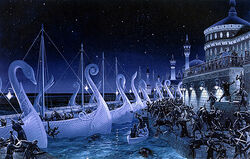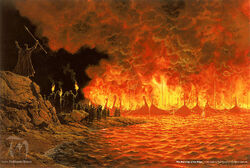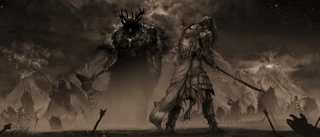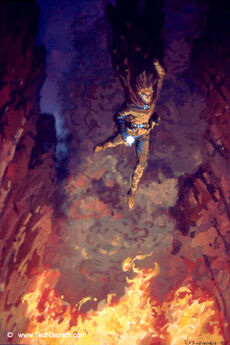Fëanor was a Ñoldorin Elf, second King of the Noldor, and one of the Elven kindred that departed from Valinor in the land of Aman, where they had lived with the Valar.
He was born in Valinor, the only child of Finwë (High King of the Ñoldor) and Finwë's first wife Míriel Therindë. He was a craftsman, gem-smith, and warrior, maker of the Silmarils, and inventor of the Tengwar script. He was also the creator of the Palantíri.
Fëanor was made the mightiest in all parts of body and mind; countenance, understanding, skill, and subtlety, of all the Children of Ilúvatar. However his personality was riddled with flaws, foremost among them selfishness and pride, which would lead to his own downfall and bring much anguish to his people.
Biography[]
Early life[]

Fëanor, by Luis F. Bejarano
Fëanor was born during the Years of the Trees in Valinor to Finwë and Míriel. He drew so much of Míriel's life energy when he was born that she grew weary of living and her spirit voluntarily left her body, leaving her family for the Halls of Mandos. After a time, Finwë remarried and had four more children; Fëanor's half-brothers Fingolfin and Finarfin, and half-sisters Findis and Irimë. Though he loved his father as dearly as a son could, Fëanor was not fond of his stepmother Indis nor her children, and so lived apart from her and his half-siblings. In his youth, he quickly discovered his outstanding talents for craftsmanship and language. In his youth, he improved upon the work of Rúmil and created the system of writing known as Tengwar, used by the Ñoldor in Middle-earth until the Third Age. He also became a student of Mahtan, a great smith who had learned his craft at the feet of Aulë himself. From Mahtan, he learned much of metallurgy, and at some point he wedded Mahtan's daughter Nerdanel, who bore him seven sons: Maedhros, Maglor, Celegorm, Caranthir, Curufin, Amrod, and Amras. He spent most of his time either alone or with his sons, such that they were all completely loyal to him. In addition to his work as a craftsman, smith, and linguist, Fëanor was possessed of exceptional oratory skill, and could persuade virtually anyone through speechcraft. He also was known to have been restless, exploring as much of Aman as he could and constantly crafting new works.[2] One of these works was believed to have been the palantíri.
The making of the Silmarils[]
By far the greatest of Fëanor's crafting achievements was the creation of the Silmarils, also called the Great Jewels. To make them, Fëanor captured some of the intermingled light from the Two Trees of Valinor and by unknown means contained it, imperishable, into three large diamond-like gems. His creations garnered him great praise, and he came to prize the Silmarils above all else. As time went on however, he began to covet the gems with a greedy love, and he increasingly ignored the fact that the light which lay in the gems and gave them their beauty was not of his own making. Fëanor alternated between vainly displaying the jewels and jealously guarding them from all but his immediate family, though eventually he came to the point where they almost always remained under lock and key.[2][3]
The wiles of Morgoth[]

Fëanor, by kimberly80
After three ages of imprisonment, Melkor, mightiest of the Valar and the world's primordial source of evil, deceived his fellows with a false show of repentance. Pardoned and residing in Valinor, his malice had in fact reached hitherto unprecedented levels, and its primary target quickly became the Elves, as it had been for their sake that he had been overthrown. He found that, of the three primary groups of Elves in Valinor, the Ñoldor were the easiest to manipulate due to their thirst for his knowledge and their willingness to listen. Focusing his efforts solely on the Ñoldor, he subtly spread lies amongst them that, amongst other things, the Valar were keeping them imprisoned in Valinor so that the race of Men might inherit Middle-earth and claim the glory that could have been theirs. Although Fëanor mistrusted and feared Melkor, in his arrogance and impatience he often unwittingly repeated the lies of Melkor. Fëanor quickly became the most prominent of the rebellious Ñoldor, to the point where the other Valar, not knowing of Melkor's influence, saw him as the source of the Ñoldor's distemper.
Melkor coveted the Silmarils and hated Fëanor, but cunningly hid all semblance of his true intentions as the situation continued to deteriorate. Melkor's influence eventually came to the point where rumors began to circulate amongst some that Fëanor's half-brother Fingolfin was planning not only to usurp his place as heir to Finwë, but also to seize the Silmarils for himself. In his pride and vanity, Fëanor took little convincing, and his hostility grew to the point to where he threatened Fingolfin with violence. The Valar, having been patient with Fëanor's rabble-rousing until that point, could not ignore the transgression of breaking the peace of Valinor. Fëanor was immediately summoned to the Ring of Doom to explain himself. Fëanor's testimony revealed the malice of Melkor and his lies, and Tulkas immediately left the Ring to apprehend him again. Despite Melkor having been the true root of the Ñoldor's unrest, Fëanor's crime had been of his own making, and for this the Valar exiled him for twelve years time from Tirion. Fëanor went to the stronghold of Formenos and took a substantial treasure with him, including the Silmarils, which he put in a locked box. In a show of support for his eldest son, Finwë also withdrew to Formenos and renounced the kingship so long as Fëanor remained in exile.

"Get thee gone, and take thy due place!" (by Jenny Dolfen)
Some time later, Melkor unexpectedly appeared at Formenos where he tried to sway Fëanor to his side, proclaiming that the Valar had treated him unjustly. However, Fëanor realized that Melkor's true goal was to obtain the Silmarils, and he vehemently dismissed the fallen Vala. Melkor left in a rage and fled from Valinor. Though Fëanor thought little of the incident, Finwë was filled with foreboding and reported Melkor's visit to the Valar immediately. However, they were unable to find so much as a trace of him, and after a time the Valar were forced to give up the search. Seven years later, the Valar announced a great feast at Valinor with the intention of repairing their relationship with the Ñoldor. Fëanor's exile was temporarily rescinded, and both he and Fingolfin were invited to attend. Though the Valar had intended for Finwë to come as well, he refused the invitation of the Valar due to Fëanor's continued exile and remained at Formenos. During the reconciliatory feast, Fingolfin extended a hand to his half-brother and openly recognized Fëanor's place as the eldest, but it was returned by Fëanor somewhat grudgingly.[2][3]
Theft of the Silmarils[]

Fëanor wearing the Silmarils, by Baran Yenileyen
Meanwhile, Melkor stole away to Avathar in the south of Aman. There he discovered the evil spider-like creature Ungoliant and secured her as an ally, promising to sate her unrelenting hunger in return for her aid. During the festivities at which Fëanor and Fingolfin had reconciled, Melkor and Ungoliant destroyed the Two Trees and plunged Valinor into complete darkness. Melkor and Ungoliant then went to Formenos, where Melkor slew Finwë and ransacked the vault, taking the Silmarils and many other treasures. They then escaped by crossing the Helcaraxë, or Grinding Ice, in the north to Beleriand in Middle-earth. Though the Valar attempted pursuit, it was ultimately in vain, for the Unlight of Ungoliant completely obscured the sight of the pursuers.
The Valar quickly realized that with the Trees dead, their light survived only in the Silmarils. To restore the Trees and foil Melkor's malice, Yavanna asked Fëanor to give up the Silmarils so that they could be broken, and the light within them released. But Fëanor emphatically stated that he would not give up his Silmarils of his own free will, and proclaimed that if the Valar forced him to do so that they would be no better than Melkor. Ultimately, Fëanor's selfishness made little difference save to further darken his own heart, for a messenger from Formenos then arrived to deliver the news of Finwë's death and the theft of the Silmarils by Melkor.[4]
The Flight of the Ñoldor[]

Fëanor and his sons swear the Oath of Fëanor
Fëanor, upon learning of his father's murder and the theft of his prized Silmarils, named Melkor "Morgoth", or "Black Foe of the World" (literally "Black Enemy"). Consumed by rage and despair, he fled the Ring of Doom. His grief quickly turned to bitterness against the Valar themselves, and he cursed the summons which had brought him away from his father. For in his despair, he believed that had he been present at Formenos when Morgoth had come, he could have saved his father. Realistically of course the summons had saved Fëanor, for though Fëanor was mighty amongst his people, he was, ultimately, merely an Elf. Indeed Morgoth had planned on killing both father and son during his break-in at Formenos, for he had possessed no prior knowledge of the Valar's festival and had assumed both would be present.

Fëanor as King, by Venlian
Now King of the Ñoldor after the death of his father, Fëanor returned to Tirion, ignoring the fact that he was still exiled, and gave one of the most impassioned speeches ever delivered in Arda. But due to his rage, grief, and pride, his speech was filled with many of the lies and half-truths of Morgoth. He railed against the Dark Lord, but he also blamed the Valar in part for Morgoth's deeds, claiming that they should have been able to stop him and had failed. He spoke of the fact that because Morgoth had attacked and badly marred the kingdom of the Valar without consequence to himself, there was neither bliss nor surety of safety to be found in Aman any longer. He evoked images of the kingdoms his people could build in Middle-earth, and the glory that could be theirs once they regained the Silmarils. Fëanor then swore an oath by the name of Ilúvatar himself that he would suffer none, no matter their race or reasons, to withhold a Silmaril from him, and that he would pursue with violence any who attempted it. The Oath of Fëanor was also taken by his seven sons below the tower of the Mindon Eldaliéva in the Great Square of Tirion. This oath became the cause for great tragedy for Fëanor's family, and for the Eldar in general.
His impassioned speech swayed most of those present, but even with his tremendous oratory skill, dissension quickly arose regarding who should lead the hosts to Middle-earth. For though Fëanor was now High King by birth, he was not well liked amongst the Ñoldor, and many of them were not of mind to accept his rule. Greater love was given to Fingolfin and his sons, and most of the Ñoldor desired greatly that Fingolfin and his sons should go with them and lead them. Fingolfin had little desire to go, but he had sworn to uphold his brother's rights as the eldest, and furthermore he did not wish to leave his people to the mercy of Fëanor's rash, self serving tendencies. Additionally, his son Fingon vehemently wished to undertake the journey, and urged his father to come along. Thus against his wisdom, Fingolfin would lead a second host, larger and not so eager to leave as Fëanor's, while Finarfin would command a third host, the smallest and most reluctant of the three. However even with the sons of Finwë leading the way, about a tenth of the Ñoldor chose simply to stay in Tirion, some for the love of Tirion and others for love of the Valar.[4][5]
The First Kinslaying[]

The battle in which the Ñoldor attacked the Teleri (by Ted Nasmith)
After delivering his speech and departing with his host, Fëanor's mood cooled somewhat and he belatedly realized that he had no practical means of transporting himself and his people to Middle-earth. Though Middle-earth and Aman were connected in those days by the Helcaraxë, a treacherous and bitterly cold region of shifting arctic ice, it was deemed to be effectively impassable. Though Morgoth and the newly empowered Ungoliant had sped across it during their escape from Valinor, even Fëanor was not so rash as to believe that the Ñoldor could accomplish any similar feat. He then gave some thought to the building of ships, but knew that there were no shipwrights amongst his people and even had there been, crafting a fleet large enough to ferry all of the Ñoldor hosts to Middle-earth would have been an utterly monumental task. Fëanor therefore went to Alqualondë where the seafaring Teleri lived, and attempted to persuade them to join him or failing that, to secure the use of their ships. But even Fëanor's impeccable wordcraft was for naught, as the Teleri had no desire whatsoever to leave Aman, and would not be persuaded for any potential glory or adventure. Nor would they give Fëanor their ships, for they held them too dearly. Fëanor angrily cited that the Teleri owed the Ñoldor for instructing them in the arts of crafting buildings and cities. But Olwë, the lord of the Teleri, was unmoved, and in friendship he urged Fëanor not to return to Middle-earth.

The Crossing of the Helcaraxe by Ted Nasmith
But Fëanor would not take no for an answer. He understood that many of his people had been inflamed by his impassioned words, and knew that haste was essential to keep cooler heads from swaying the Ñoldor to a more reasonable course. As such, he persuaded his host to aid him in taking the ships by force. This he attempted, but the Teleri resisted, casting many of the the Ñoldor into the sea and thrice driving them back despite being far more lightly armed than the Ñoldor. However Fingolfin's host, larger and less eager to undertake the journey, had been slower in departing Tirion than had Fëanor's host. Following after Fëanor, the vanguard led by Fingon came upon the battle after Fëanor's host had been pushed back for the third time. Assuming that the Teleri had been the aggressors, perhaps even on the orders of the Valar themselves, Fingolfin's host joined the battle and the Teleri were overcome. Their ships were stolen, and many of the Teleri mariners were wickedly slain. However, the Ñoldor did not escape unscathed by any means. In addition to taking significant losses during the battle, Ossë, who loved the Teleri dearly, conjured terrible storms in vengeance for them. Many of the stolen ships were wrecked in these storms, and their Ñoldor crews drowned.
A short while after the battle, as the Ñoldor neared the Helcaraxë, they encountered a shrouded figure who may well have been Mandos himself. This figure uttered a terrible Doom, exiling the Ñoldor from Valinor and foretelling that their war against Morgoth would cause them only misery. Due to their wickedness in slaughtering their kin, they would be utterly forsaken in the eyes of the Valar, and would receive neither welcome nor aid from Valinor in their struggles. Additionally, Fëanor and his house were cursed, and Mandos foretold great suffering and hardship would be their lot, due in no small part to the oath they had taken to regain the Silmarils at all costs. Above all, the figure made it explicitly clear that any war made by the Ñoldor against Morgoth would be entirely without hope; for Elves, no matter how mighty, simply did not possess the power to overcome a Vala. Upon hearing this Doom, Finarfin and his host turned back in grief, cursing Fëanor.[See Note] They had not participated in the Kinslaying and as such were pardoned by the Valar when they returned. They were gladly accepted back into Tirion by their remaining kin, whereafter Finarfin ruled as High-King of the Ñoldor in Aman.
Fëanor however defied the Doom and proceeded onward, accompanied by Fingolfin and the two remaining hosts. As such the journey northward continued, the land became ever darker, and as the Ñoldor drew ever closer to the Helcaraxë, the temperature began to precipitously drop. It was at this point that many of the Ñoldor began to openly express dissatisfaction with Fëanor's leadership. Many of them had been reluctant to accept his kingship to begin with, and now the Kinslaying and the Doom had significantly decreased their tolerance for his belligerence. Additionally, the current situation presented a number of more practical issues. Not only were many of the Ñoldor suffering terribly from the arctic cold, but it had become clear that the storms of Ossë had wrecked too many of the ships to bear all of the Ñoldor at once to Middle-earth. However, the Doom of Mandos had kindled fear of treachery in the hearts of the Ñoldor, and none were willing to be left in Aman while others crossed the sea first. Fëanor was all too aware of both the dissatisfaction of his people and the problem that lay in ferrying all of them to Middle-earth, and he sought counsel with his sons.

Fëanor watches the burning of the Teleri boats
During this meeting, it came to light that Fëanor's most loyal forces had incidentally maintained sole control of the Teleri fleet after having seized it. As such, Fëanor decided to simply abandon in Aman all those whose loyalty to him was not absolute, and he and his followers slipped away one night in the ships. They arrived at Losgar, in the land of Lammoth, in the far west of Beleriand, where Morgoth and Ungoliant had passed not long before. Upon arriving, Fëanor's eldest son Maedhros at once asked who would return upon the ships to ferry the rest of their people, but Fëanor contemptuously decided to burn the ships and leave the followers of Fingolfin behind. This action was looked upon poorly by Maedhros, but he did not speak his mind to his father, and simply watched in stony silence as the ships burned. As the world was flat in those days, the remaining Ñoldor saw the far distant glow of the flames, and perceived that they were betrayed. Fingolfin now had the choice of either returning to Tirion in disgrace, or proceeding to Middle-earth across the treacherous and deadly Helcaraxë. Fingolfin and his people chose to attempt the crossing, as many of Fingolfin's host wished to continue and many, including Fingolfin himself, were eager to confront Fëanor and his people over their betrayal. In addition, and unlike the host of Finarfin, Fingolfin's host had unwittingly participated in the Kinslaying, and they did not know how they might be judged if they were to return to the realm of the Valar. The journey across the Grinding Ice was a long and terrible one, and Fingolfin's host suffered great loss of life along the way, adding to the bitterness that the survivors felt for Fëanor and his sons.[5]
Final battle and death[]

Fëanor faces Gothmog by CK Göksoy
Learning of the Ñoldor's arrival, Morgoth summoned his armies from his fortress of Angband and attacked Fëanor's encampment in Mithrim. This confrontation was called the Battle under the Stars, or Dagor-nuin-Giliath, for the Sun and Moon had not yet been made. Though the Ñoldor were caught completely by surprise, they won the battle handily, for the light of Valinor was still fresh within them. But Fëanor, exhilarated by his victory and ever prideful, thought to come upon Morgoth himself and pursued the Orcs. He took with him only a small vanguard, and he and his men ventured far ahead of the main Ñoldor force. As Fëanor and his unit approached the gates of Angband, the fleeing Orcs noted the small size of the Elven force, and turned and gave battle. The engagement's proximity to Angband saw a number of Balrogs emerge to aid the Orcs, and they quickly slew most of the Elves. Despite this, Fëanor was undaunted, and he long fought on alone despite being dealt many wounds. At last however, he was stricken to the ground by Gothmog, the Lord of Balrogs.
Fortunately for Fëanor, his sons arrived with a substantial relief force. The Balrogs and the remaining Orcs returned to Angband, and Fëanor's sons took him from the battlefield. However, Fëanor knew that his wounds were mortal, and bade his sons to stop. He looked upon Angband and cursed Morgoth thrice, but gazing upon the sheer scope of Morgoth's stronghold, he understood at last the truth of Mandos's words; no force of the Ñoldor ever could or would overthrow the Dark Lord. Nevertheless, he instructed his sons to keep to their oath and avenge their father. As he died, his fiery spirit left his body and burned it to ash.[5]
Legacy[]

Star of Earendil

Maedhros casts himself and his Silmaril into the earth

Maglor casts his Silmaril into the sea
On Fëanor's passing, his son Maedhros became High King of the Ñoldor. Maedhros, however was a prisoner of Morgoth, but was freed by Fingon. Maedhros therefore, out of a desire to keep his people united, and an acknowledgement that, as Finwë's oldest surviving son, the kingship ought to pass to him by right of birth, renounced the throne in favor of Fingolfin. This acknowledgement had the unifying effect that Maedhros desired, and eliminated the possibility of more internal strife amongst the Ñoldor's royal Houses.[6] Fingolfin's descendants would reign over the Ñoldor until the death of Gil-galad many centuries later. Fëanor's deeds, many of which were infamously despicable, cast a shadow over the interactions between the Sindar and the returning Ñoldor. For Thingol, the King of Doriath, eventually learned of the Kinslaying, the burning of the ships at Losgar, and the curse of Mandos. As the Teleri were of Thingol's own kin, he was enraged to hear of the merciless and needless slaughter. The sons of Finarfin he came to forgive, as they were of his own kin and had not participated in the evil. Those of Fingolfin's host, who had endured the horror of crossing the Helcaraxë after Fëanor's betrayal, he held as having suffered enough hardship to redress their ills. But all those who had followed Fëanor, were of his kin, or were friends of his kin, Thingol held in contempt and would have as little to do with as he could. Fëanor's remaining sons were still bound by the Oath to recover the Silmarils, and this oath would eventually see two more Kinslayings come to pass, each more horrific than the last, and would work to undermine the Elven war against Morgoth in many important ways. Eärendil's fate was to eternally traverse the Great Ocean with the Silmaril that Beren and Lúthien had wrested from Morgoth and guard the Sun and Moon. After the War of Wrath, Maglor and his last surviving brother Maedhros stole the two remaining Silmarils taken by the Valar from Morgoth, even though initially Maglor tried to dissuade his older brother from doing this. But because of the evil deeds committed by the brothers to regain the jewels, they burned in Maglor and Maedhros's hands. Unable to bear the suffering, Maedhros cast himself and the Silmaril he carried into a fiery chasm in the Earth. Unable to bear the suffering, Maglor cast his Silmaril into the sea. Thereafter, he wandered along the shores of the world singing laments over the loss of the Silmaril, until he faded from memory, though the circumstances and date of his death, if it ever happened at all, are unknown.

The inscription on the door to Moria, with interpretation

Fëanor's hammer in The Rings of Power, in which it is used by Celebrimbor
Fëanor's grandson Celebrimbor, son of Curufin, repented of his family's actions and would remain in Middle-earth into the Second Age, where he founded the realm of Eregion. Like Fëanor, Celebrimbor would be a great smith and helped create the Doors of Durin in Khazad-dûm, which would later bear the emblem of the House of Fëanor: a single star with many rays. However Celebrimbor, who also created the Rings of Power, would later be killed by Sauron, ending Fëanor's line.
Etymology[]
- Originally named Finwë or Finweminya after his father, and later Curufinwë ("Skillful [son of] Finwë"), he was the greatest craftsmen of the Ñoldor, and very briefly their king.
- His name is a compromise between the Sindarin Faenor and the Quenya Fëanáro, meaning "Spirit of fire". His current name, which appeared in the Silmarillion, is pronounced FAY-ahnor.
Appearances in the books[]
- The Silmarillion: Quenta Silmarillion
- The History of Middle-earth, Vol. XII: The Peoples of Middle-earth
- The Lord of the Rings (mentioned only)
House of Fëanor[]
| Finwë |
| Míriel |
| Mahtan | |||||||||||||||||||||||||||||||||||||||||||||||||||||||||||||||||||||||||||||||||||||||||||||||||||||||||||||||||||||||||||||
|
|
|
|
|
|
|
|
|
|
| ||||||||||||||||||||||||||||||||||||||||||||||||||||||||||||||||||||||||||||||||||||||||||||||||||||||||||||||||||||||||
|
|
| Fëanor |
|
|
| Nerdanel | |||||||||||||||||||||||||||||||||||||||||||||||||||||||||||||||||||||||||||||||||||||||||||||||||||||||||||||||||||||||||||
|
|
|
|
|
|
|
| |||||||||||||||||||||||||||||||||||||||||||||||||||||||||||||||||||||||||||||||||||||||||||||||||||||||||||||||||||||||||||
|
|
|
|
|
|
|
|
|
|
|
|
|
|
|
|
|
|
|
|
|
|
|
|
|
|
| ||||||||||||||||||||||||||||||||||||||||||||||||||||||||||||||||||||||||||||||||||||||||||||||||||||||||
| Maedhros |
| Maglor |
| Celegorm |
| Caranthir |
| Curufin |
| Amrod |
| Amras | |||||||||||||||||||||||||||||||||||||||||||||||||||||||||||||||||||||||||||||||||||||||||||||||||||||||||||||||||||||
|
|
|
|
|
|
|
|
|
|
|
|
|
|
|
|
|
|
| ||||||||||||||||||||||||||||||||||||||||||||||||||||||||||||||||||||||||||||||||||||||||||||||||||||||||||||||||
|
|
|
|
|
|
|
|
|
|
|
|
|
|
|
|
| Celebrimbor | |||||||||||||||||||||||||||||||||||||||||||||||||||||||||||||||||||||||||||||||||||||||||||||||||||||||||||||||||
Translations[]
| Foreign Language | Translated name |
| Amharic | ፈኣኖር |
| Arabic | فيانور |
| Armenian | Ֆեանոր |
| Belarusian Cyrillic | Фёанор |
| Bengali | ফেরানোর |
| Bulgarian Cyrillic | Феанор |
| Catalan | Fèanor |
| Chinese (Hong Kong) | 費諾 |
| Georgian | ფეანორი |
| Greek | Φέανορ |
| Gujarati | ફએનોર |
| Hebrew | פיינור |
| Hindi | फ़ेअनोर |
| Japanese | フェアノール |
| Kazakh | Феанор (Cyrillic) Fëanor (Latin) |
| Korean | 페아노르 |
| Kyrgyz Cyrillic | Фэанор |
| Macedonian Cyrillic | Феанор |
| Marathi | फेनोर |
| Mongolian Cyrillic | Фёанор |
| Nepalese | फ़ेअनोर |
| Pashto | فېانور |
| Persian | فئانور |
| Punjabi | ਫੇਨੋਰ |
| Russian | Феанор |
| Serbian | Феанор (Cyrillic) Fëanor (Latin) |
| Sinhalese | ෆෙඅනොර් |
| Tajik Cyrillic | Феанор |
| Tamil | பியானோர் |
| Telugu | ఫీనోర్ |
| Thai | เฟอานอร์ |
| Ukrainian Cyrillic | Феанор |
| Urdu | فےانور |
| Uzbek | Феанор (Cyrillic) Fëanor (Latin) |
| Yiddish | פעאַנאָר |
| High King of the Ñoldor | ||
| Preceded by Finwë |
Fëanor | Succeeded by Fingolfin |
| YT 1495 - YT 1497 | ||
References[]
- ↑ 1.0 1.1 1.2 The History of Middle-earth, Vol. X: Morgoth's Ring, The Annals of Aman
- ↑ 2.0 2.1 2.2 The Silmarillion, Quenta Silmarillion, Chapter VI: "Of Fëanor and the Unchaining of Melkor"
- ↑ 3.0 3.1 The Silmarillion, Quenta Silmarillion, Chapter VII: "Of the Silmarils and the Unrest of the Noldor"
- ↑ 4.0 4.1 The Silmarillion, Quenta Silmarillion, Chapter VIII: "Of the Darkening of Valinor"
- ↑ 5.0 5.1 5.2 The Silmarillion, Quenta Silmarillion, Chapter IX: "Of the Flight of the Noldor"
- ↑ The Silmarillion, Quenta Silmarillion, Chapter XIII: "Of the Return of the Noldor"


